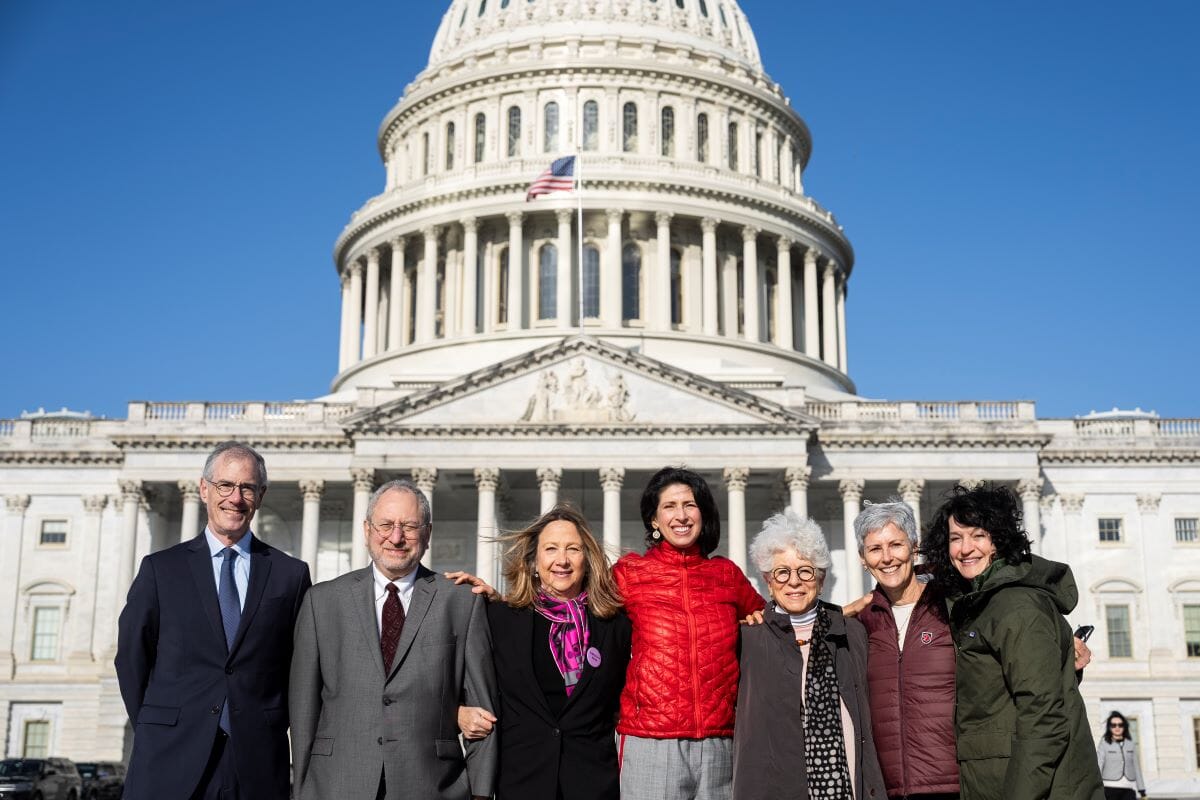The first time I visited Washington, D.C., was for a conference when I was 28. Despite my parents teaching my sister and me to be good citizens, a trip to see the government sausage get made was not a part of our early education.
But my years as an AJWS Board member showed me a different side of DC – one that is essential to advancing global human rights. Today I embrace my political activism and, because of this country’s oversized influence on the lives of people around the world, I feel energized by being in the place where our laws are made. AJWS is marking its 40th year at a time when the character of U.S. government’s leadership has changed into something disturbing. So, I traveled to Washington, D.C. with AJWS to advocate for policies and funding to promote and protect global human rights.
I arrived early in order to visit the National Portrait Gallery, specifically to see President Obama’s other-worldly portrait by Kehinde Wiley. I stood mesmerized, remembering the immense pride I felt to have someone in power who reflected my values. I walked away feeling the weight of how far our country has fallen and overwhelmed by the work required to get us back on course.
I walked into our AJWS Lobby Day training with a fire in my belly. Rori Kramer, AJWS’s Director of U.S. Advocacy, minced no words when describing the current cuts to U.S. foreign assistance. Today, our institutions, rule of law and democratic norms are all under threat. Members of Congress have relinquished their responsibilities, allowing President Trump to rescind foreign assistance funds they have already allocated.

I was moved to find that most of those lobbying on the Hill were AJWS Global Justice Fellows, Jewish clergy involved in a yearlong program learning how to become advocates for global human rights. This year’s cohort traveled to the Dominican Republic where they met with activists fighting the hardships and indignities imposed upon their Haitian neighbors. It is impossible to sugar-coat how horrendous the situation is in Haiti with humanitarian, governance and security crises overlapping one another and making daily life dangerous and untenable. And these difficulties have only been exacerbated by Trump’s policies including, the abrupt halt in US foreign aid funding and the end of Temporary Protective Status for roughly 700,000 Haitians living in the U.S. who may be forced to return to Haiti – most likely to their deaths.
It was interesting to speak with our elected officials about global issues at a time when there is so much tumult here in our country. I felt great empathy for the (seemingly exhausted) foreign policy staffers we met with who are fighting with us against the Trump administration’s dangerous and cruel foreign assistance cuts. This empathy echoes the admiration I feel for AJWS grantees, powering forward with their work despite the obstacles in their way. And indeed, this is what AJWS has been doing for 40 years: amplifying the voices of the activists we support and advocating policies that protect and promote their human rights. Regardless of what is happening here domestically — we will not and do not abandon our partners.
Over an intense few days, Rabba Rori Picker Neiss, one of the Global Justice Fellows, guided us with words of wisdom. She told us that it is far too easy to see terrible things in this world and assume that we are exempt. It is a false hope to think that the suffering that affects people who look different to us won’t reach us. Rabba Picker Neiss said the Talmud teaches that once we allow destruction to be unleashed into the world—be it poverty, mass deportations, denationalization, pain, —we cannot control whom it hits. And we can all be consumed by it.
When we remember the ancient story of the houses of the Israelites being passed over by the Angel of Death, we must also remember that the Israelites were warned not to celebrate, flaunt or take for granted being spared. We can never witness the suffering of others and assume ourselves to be exempt. Because none of us are. These are the values and principles of AJWS’s founding, and ones that I am honored to uphold today. Our grantees won’t be defeated, and neither will we. As Rori Kramer says, “we are heartbroken, but we know our purpose.”
